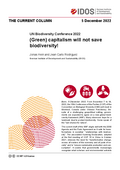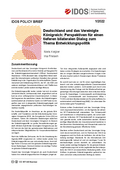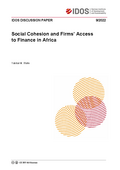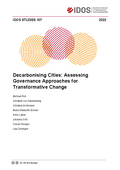-

Publications
Photo: www.shutterstock.com/de/image-photo/pont-du-gard-old-roman-aqueduct-45688924
Publications
The German Institute of Development and Sustainability (IDOS) publishes four independent publication series. IDOS researchers publish their current research results in Discussion Papers, Policy Briefs and Studies. Visiting scholars and cooperation partners also have the opportunity to publish their research results in one of the IDOS series. Publications from the series Analysen und Stellungnahmen, Briefing Paper and Two-Pager / Zweiseiter, which will be discontinued in 2022, will continue to be available online. The fourth publication series is for opinion pieces: The Current Column regularly comments on the latest developments and issues in international development policy.
IDOS researchers also regularly publish their research results in peer-reviewed and non-peer-reviewed German and international journals and publication series of other research institutes and institutions as well as with renowned book publishers. In addition, they use blogs and online platforms of partner institutions to communicate the Institute's research and advisory activities to an interested public.
Found 9409 results in 8 milliseconds. Displaying results 3501 to 3510 of 9409.
-
Goal 3: Ensure healthy lives and promote well-being for all at all ages
-
Internationale Organisationen
-
Private finance for adaptation: do private realities meet public ambitions?
-
The devolution of the land and building tax in Indonesia
-
The G20 summit in Antalya: who governs the world economy?
-
Rescaling of access and property relations in a frontier landscape: insights from Jambi, Indonesia
-
Ethnic heterogeneity and public goods provision in Zambia: evidence of a subnational “diversity dividend”
-
Europa sollte sich nicht beschweren
-
A comparative analysis of the effectiveness of four supply chain initiatives to reduce deforestation
-
Financing global development: Is impact investing an investment model with potential or just blowing smoke?














